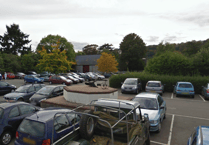THE new 20mph zones in Monmouth have ‘gone live’, according to Monmouthshire Council posts, with large banners on lampposts declaring ‘Safer@20’.
Supporters say it will make roads safer for pedestrians and cyclists, as they seek to promote ‘active travel’, and reduce air pollution.
But political opponents of the Welsh Government’s lower-speed policy for all high streets and residential areas - due to go Wales-wide in September – have slammed the £32m nationwide cost of introducing the policy, and a potential £4.5bn hit to the national economy over the next 30 years.
It’s also unclear whether police will currently be able to enforce all of the 20mph zones in Monmouth – introduced as a pilot phase 2 roll out by the the Labour-led Monmouthshire Council – with some 30mph signs still in place, including at least two flashing speed smart signs which only turn red at 31mph.
Before the council’s social media posts a week last Monday (February 6) that the zones were now ‘live’, Gwent Police told the Beacon that “incorrect signs and/or incorrect traffic orders clearly outlining the speed limit for that road” would make the limits unenforceable.
In Overmonnow, one small 20mph sign on a main road is followed just 20 yards later by a much larger 30mph sign which has not been removed by Monmouthshire Council highways, sparking confusion among drivers.
Lower speeds have already been introduced in Abergavenny and around Caldicot phase one of the council’s pilot roll out, funded by the Welsh Government, although protests in the latter have seen some 30mph limits restored.
The Labour-led county council says lowering the speed limit will help “reduce the number and severity of road casualties” and “support alternative travel modes such as walking and cycling by making the roads less intimidating to non-motorised vehicle users (while) benefiting physical and mental wellbeing”.
But Conservative Senedd members this week slammed the ‘go slow’, saying it will see Wales ‘grind to a halt’ and seriously damage the economy, with the Government’s own commissioned analysis predicting a loss to the economy of potentially up to £4.5bn hit.
A petition calling for the Labour Government in Cardiff Bay to scrap its imposition of a blanket nationwide 20mph speed limit has now received nearly 50,000 signatures.
And Welsh Conservative Shadow Transport Minister Natasha Asghar, the South East Wales regional MS, said: “I have been – and continue to be – inundated with emails from furious citizens across Wales, and this petition only further highlights the strength of feeling out there about Labour’s plan to grind Wales to a halt – and that’s why I’ve signed it myself.
“This hated law will hit the Welsh economy for six and cost taxpayers a fortune, causing misery for drivers and failing to address congestion.
“It seems that with default 20mph speed limits, the road-building ban, and a rumoured congestion charge, the anti-car, anti-worker, anti-growth agenda of Labour will only get worse.”
She said that in response to a written question, the Government had revealed that the amount of taxpayer money spent on 20mph roads in Wales had exploded by more than 500 per cent in just one year, from £1.8m in 2021/22 to £9.8m this year.
And with analysis showing a huge possible long-term cost to the economy due to longer journey times, she added: “If Labour ministers are under the impression that they can spend millions of pounds to grind the Welsh economy to a halt to the tune of £4.5bn, then they are in for a rude awakening.”
Twenty mph may be appropriate for certain areas, like outside parks and schools, she said, but added: “Instead of making the lives of car owners more miserable, Labour should drop this ridiculous proposal as well as finally ending the roadbuilding ban and putting to bed rumours of a congestion charge, and focus on addressing the people’s priorities of economic development and the NHS.”
She also highlighted new research “revealing that cutting speed limits on urban roads to 20mph does not significantly improve safety”.
The three-year study from Queen’s University Belfast, Edinburgh University and the University of Cambridge found the lower limit had “seemingly little impact” on “road traffic collisions, casualties and speed” in Belfast.
Meanwhile, Gwent Police say of enforcing the lower limits: “Our understanding is that Monmouthshire County Council are altering signs within Monmouthshire in readiness for the legislation change in September.
“Police and GoSafe will not be in a position to enforce on any roads where there are incorrect signs and or incorrect traffic orders clearly outlining the speed limit for that road.”
The ‘Stop the Welsh Govt imposing blanket 20mph speed limits across the whole of Wales by 2023’ petition is at change.org.




.JPG?width=209&height=140&crop=209:145,smart&quality=75)
Comments
This article has no comments yet. Be the first to leave a comment.